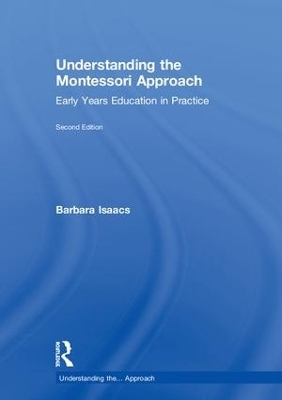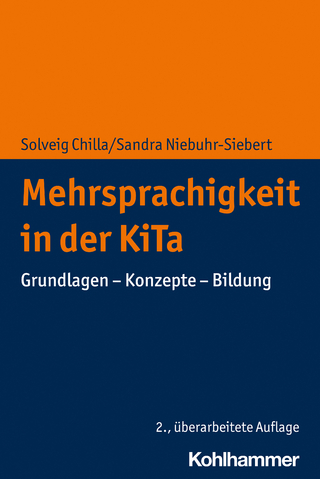
Understanding the Montessori Approach
Early Years Education in Practice
Seiten
2018
|
2nd edition
Routledge (Verlag)
978-1-138-69053-0 (ISBN)
Routledge (Verlag)
978-1-138-69053-0 (ISBN)
This second edition describes the key principles of the Montessori approach to early childhood supported with examples and case studies. Exploring all areas of the curriculum, the book has been updated to take into account curriculum changes and the relationship of media and technology to the Montessori approach.
Understanding the Montessori Approach is a much-needed source of information for those wishing to extend and consolidate their understanding of the Montessori Approach and how it is used in the teaching and learning of young children. The book will enable the reader to analyse the essential elements of this Approach to early childhood and and its relationship to quality early years practice.
This second edition has been fully updated to reflect changes in the Early Years Foundation Stage and includes a fresh examination of the relationship between technology and the Montessori approach, as well as a brand new chapter, Learning in Montessori Settings. Exploring all areas of the curriculum including the organisation of Montessori schools, the environment, learning and teaching and the outcomes for children, this book:
examines the historical context of the Montessori approach and its relevance to modern-day education;
explores Montessori's views of child development and the role of the learning environment in a child’s educational development;
details the organisation of Montessori schools worldwide and the structure of a typical day in a Montessori setting;
highlights the principles of Montessori pedagogy, including the tools and strategies employed by its practitioners;
considers how and what children learn in a Montessori setting and the links with EYFS 2017;
includes new benefits and challenges of the Montessori approach to children's lives.
Understanding the Montessori Approach provides an accessible overview of this major pedagogical influence on early years practice, supported by case studies, examples, summaries and reflective practice questions. This new edition not only highlights the core ideas that practitioners should consider when reviewing and reflecting on their own practice, but accomodates revisions to educational curriculum and policy in order to serve as an invaluable resource for students and practitioners alike.
Understanding the Montessori Approach is a much-needed source of information for those wishing to extend and consolidate their understanding of the Montessori Approach and how it is used in the teaching and learning of young children. The book will enable the reader to analyse the essential elements of this Approach to early childhood and and its relationship to quality early years practice.
This second edition has been fully updated to reflect changes in the Early Years Foundation Stage and includes a fresh examination of the relationship between technology and the Montessori approach, as well as a brand new chapter, Learning in Montessori Settings. Exploring all areas of the curriculum including the organisation of Montessori schools, the environment, learning and teaching and the outcomes for children, this book:
examines the historical context of the Montessori approach and its relevance to modern-day education;
explores Montessori's views of child development and the role of the learning environment in a child’s educational development;
details the organisation of Montessori schools worldwide and the structure of a typical day in a Montessori setting;
highlights the principles of Montessori pedagogy, including the tools and strategies employed by its practitioners;
considers how and what children learn in a Montessori setting and the links with EYFS 2017;
includes new benefits and challenges of the Montessori approach to children's lives.
Understanding the Montessori Approach provides an accessible overview of this major pedagogical influence on early years practice, supported by case studies, examples, summaries and reflective practice questions. This new edition not only highlights the core ideas that practitioners should consider when reviewing and reflecting on their own practice, but accomodates revisions to educational curriculum and policy in order to serve as an invaluable resource for students and practitioners alike.
Barbara Isaacs is Chief education Officer, Montessori St. Nicholas Charity / Montessori Centre International.
Introduction 1. Historical context 2. Montessori’s Views of Child Development 3. Organisation of Montessori schools 4. Principles of Montessori Pedagogy 5. Learning in Montessori Settings 6. The Favourable Environment 7. Benefits and Challenges of the Montessori Approach to Children’s lives and communities of today Appendix 1. Montessori education for 12– 18 year olds Appendix 2. Glossary of terms Appendix 3. Key Montessori texts Appendix 4. Leading UK and international Montessori organisations Bibliography Index
| Erscheinungsdatum | 26.04.2018 |
|---|---|
| Reihe/Serie | Understanding the… Approach |
| Zusatzinfo | 6 Illustrations, black and white |
| Verlagsort | London |
| Sprache | englisch |
| Maße | 174 x 246 mm |
| Gewicht | 421 g |
| Themenwelt | Sozialwissenschaften ► Pädagogik ► Vorschulpädagogik |
| Wirtschaft ► Betriebswirtschaft / Management ► Personalwesen | |
| ISBN-10 | 1-138-69053-8 / 1138690538 |
| ISBN-13 | 978-1-138-69053-0 / 9781138690530 |
| Zustand | Neuware |
| Informationen gemäß Produktsicherheitsverordnung (GPSR) | |
| Haben Sie eine Frage zum Produkt? |
Mehr entdecken
aus dem Bereich
aus dem Bereich
Bilderbuch, Handbuch, Übungskarten im Set
Buch | Softcover (2024)
Lehmanns Media (Verlag)
79,90 €
Grundlagen - Konzepte - Bildung
Buch | Softcover (2022)
Kohlhammer (Verlag)
34,00 €
persistierende Restreaktionen frühkindlicher Reflexe und ihre …
Buch | Hardcover (2023)
modernes lernen (Verlag)
22,95 €


